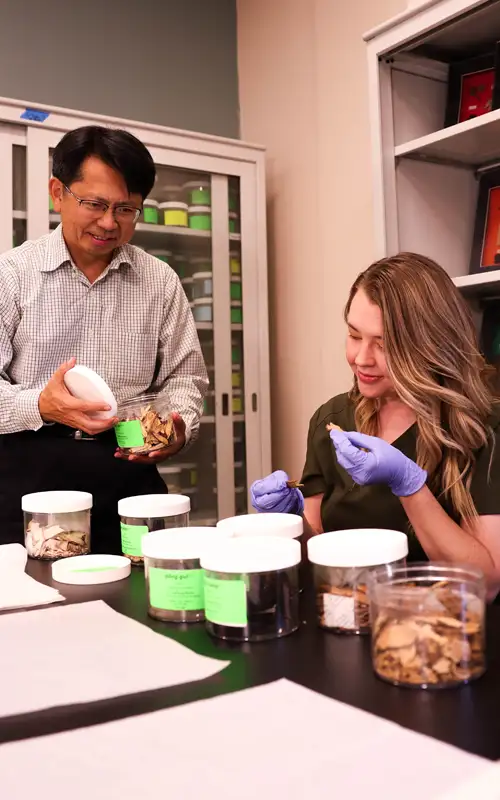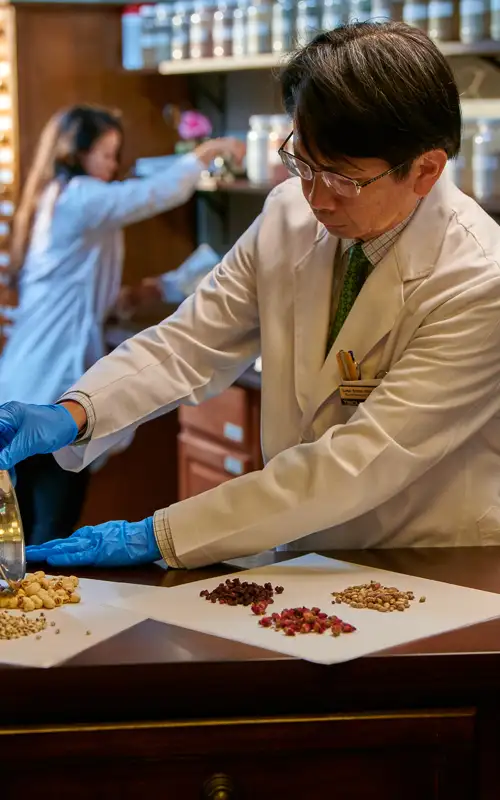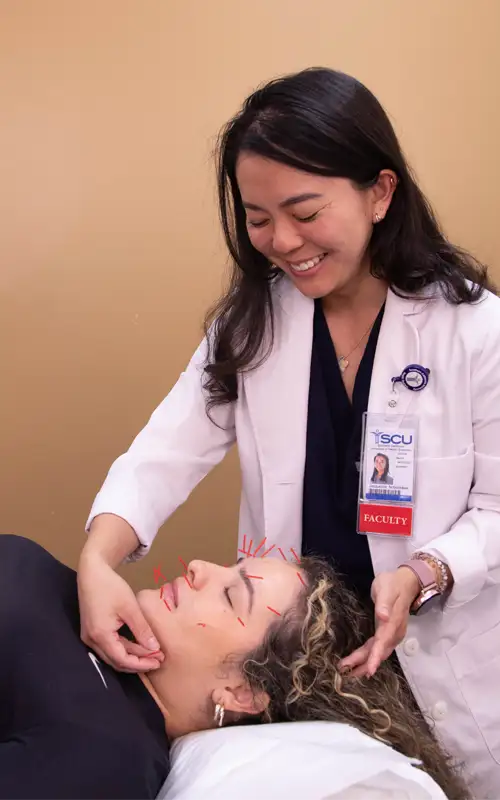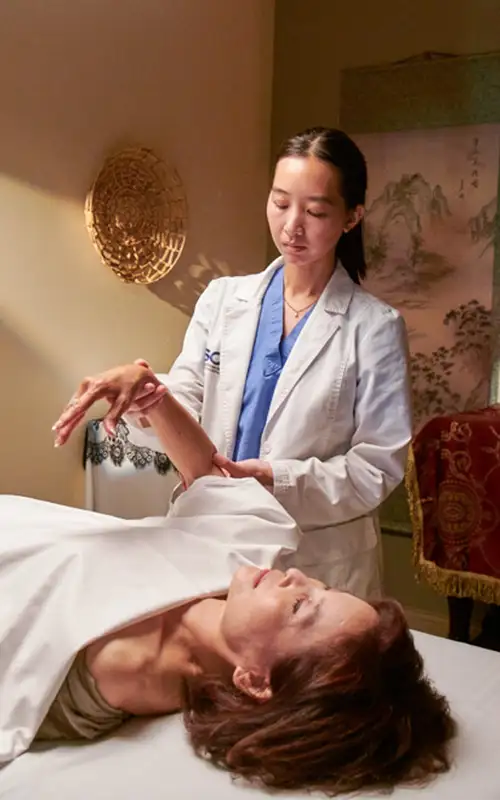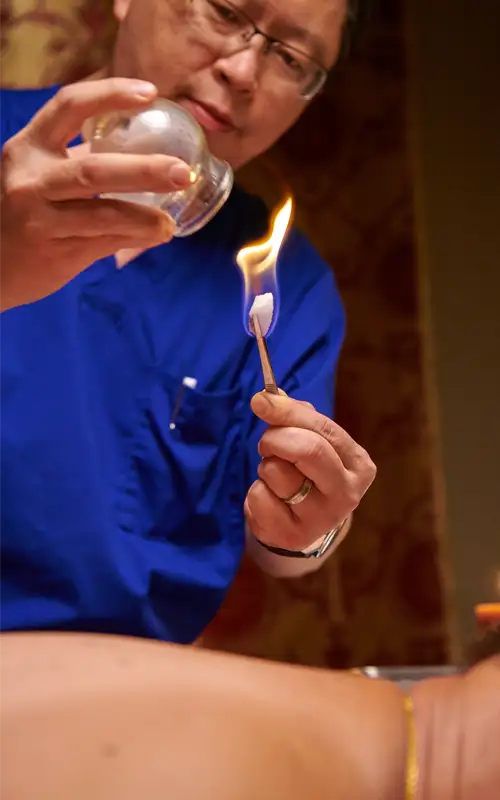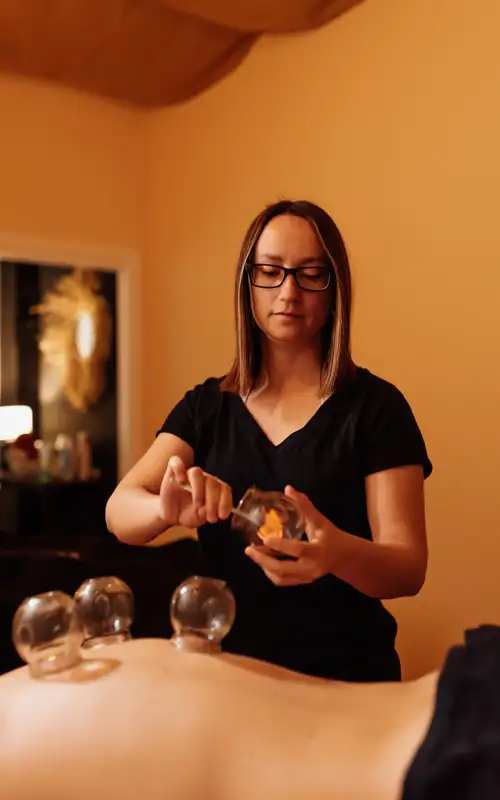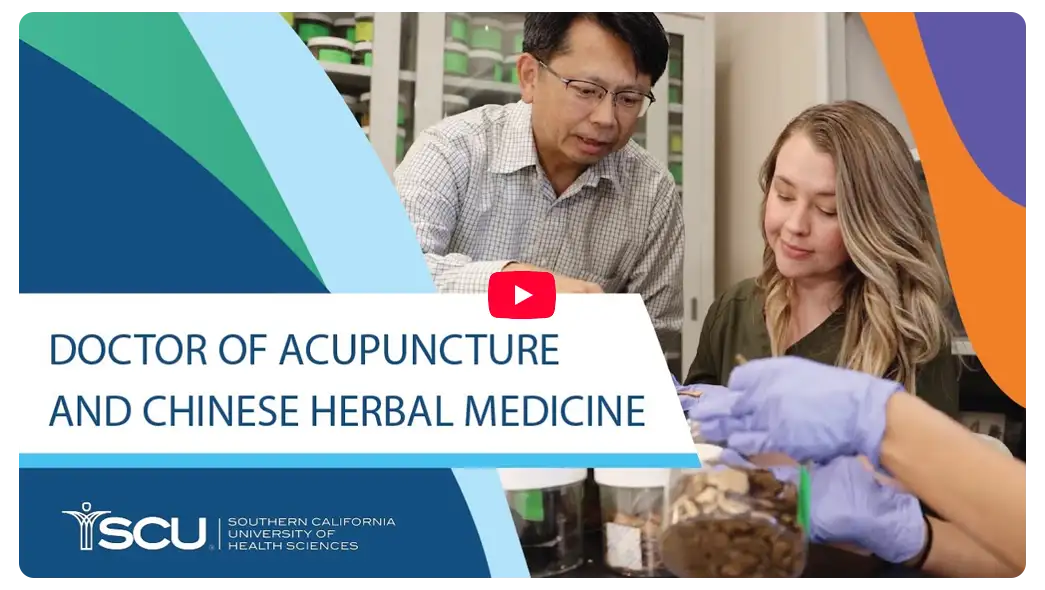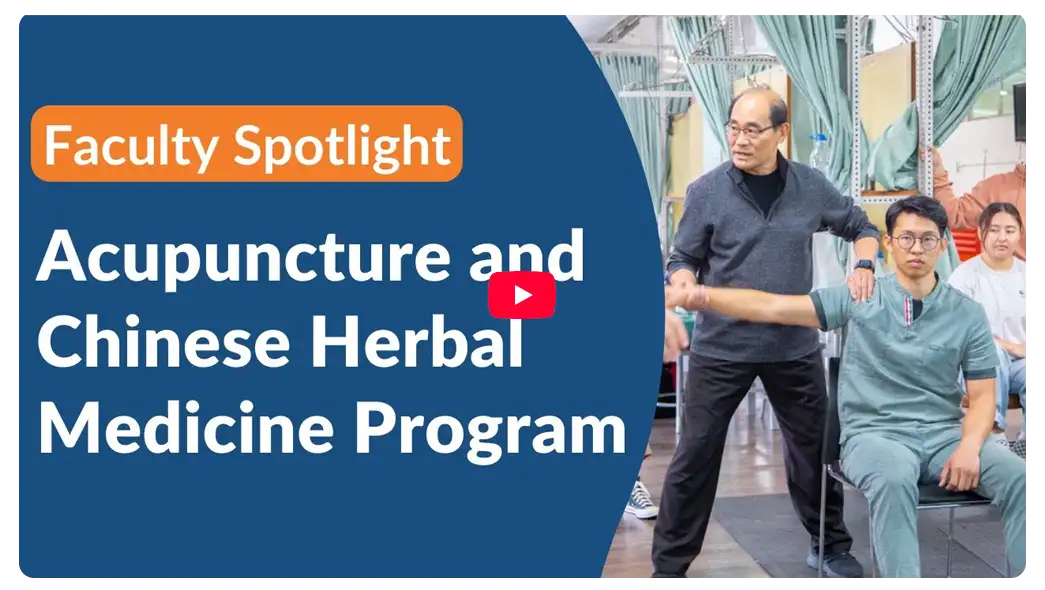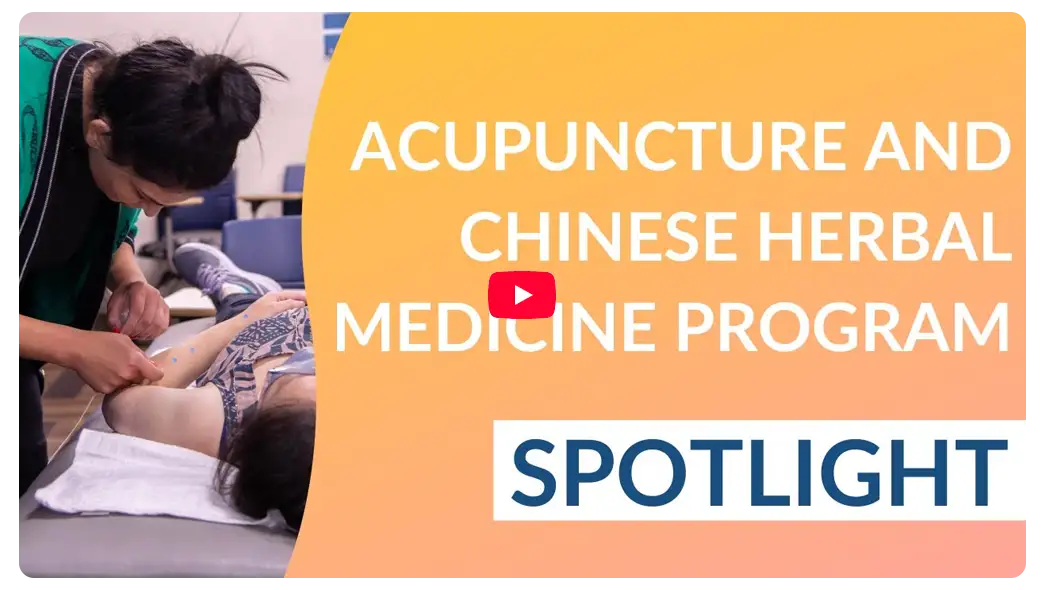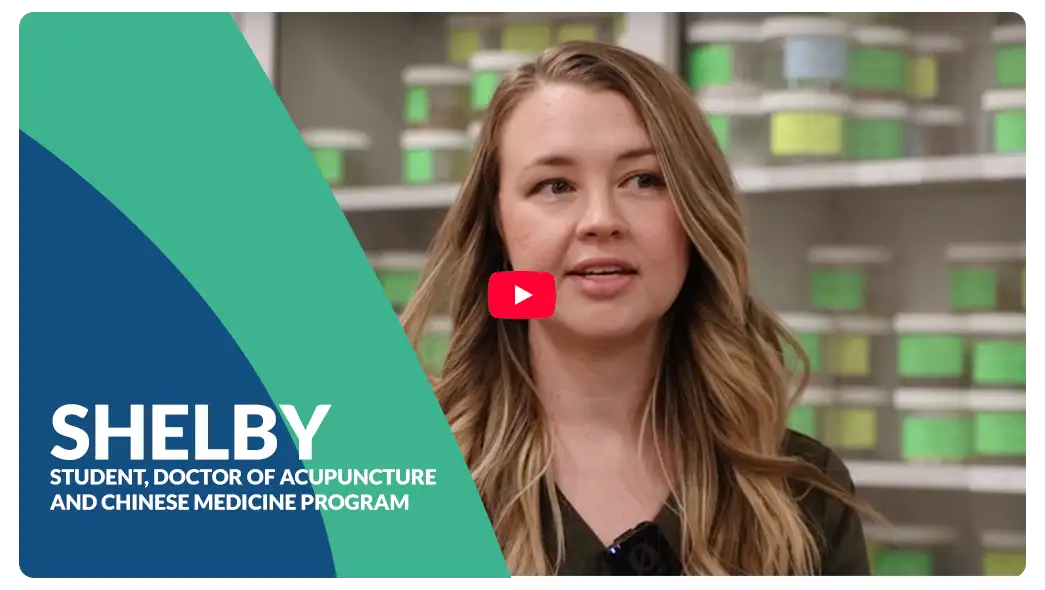Doctor of Acupuncture and Chinese Herbal Medicine
Overview
Developed more than 2,000 years ago, acupuncture and Chinese herbal medicine (often referred to as Traditional Chinese Medicine or “TCM”) is one of the world’s most time-tested, holistic healing systems. Based on the idea that health requires a harmonious balance between the body, mind, spirit, and environment, TCM incorporates a range of treatments (from acupuncture and herbal medicine to nutrition and therapeutic massage, to mind-body practices like Qigong or Tai Chi) to promote overall wellness rather than treating individual diseases in isolation.
SCU’s entry-level doctorate in Acupuncture and Chinese Herbal Medicine was the first recognized in California and one of the first two to be ACAHM-accredited in the United States. Our unique and forward-thinking program blends the best of traditional practices with the best of Western biomedicine—empowering you with well-rounded skills for today’s healthcare industry.
Program at a Glance
- Three formats:
- Full-time, in-person, daytime: 3 years and 4 months (10 terms)
- Full-time, in-person, evening: 4 years (12 terms)
- Part-time, blended flex schedule: 4 to 7 years (12-20 terms)
- No bachelor’s requirement:
- Start with 90+ undergraduate credits, finishing your bachelor’s degree as you complete your Doctorate, with no added time
- Start with 48+ credits, entering our Bachelor of Science in Health Sciences program with a concentration in Eastern Medicine, and then transfer into the Doctorate program, saving time and money
- Option to earn two doctorates at once (Doctor of Acupuncture & Chinese Herbal Medicine and Doctor of Chiropractic) through a unique dual-degree pathway
- Prepares graduates for the National Certification Board for Acupuncture and Herbal Medicine (NCBAHM™) exam as well as the California Acupuncture Licensing Examination (CALE)
- Accredited by The Accreditation Commission for Acupuncture and Herbal Medicine (ACAHM) and approved by the California Acupuncture Board (CAB)
- Fixed tuition guarantee, federal financial aid for those who qualify, and a range of institutional and program-specific scholarship opportunities
Upcoming Start Dates
- Spring: January 5th, 2026
- Summer: May 4th, 2026
- Fall: September 8th, 2026
Click on the image above to see our Acupuncture and Chinese Medicine program in action.
What Sets Our Program Apart?
CURRICULUM THAT HONORS THE TRADITIONAL WHILE EMBRACING THE MODERN
At SCU, in addition to developing deep expertise in acupuncture and Chinese herbal medicine, you’ll learn Western medical terminology, diagnostic imaging, and more—equipping you with more tools to improve patient care and helping you confidently navigate conventional healthcare environments.
EARLIER HANDS-ON TRAINING
You won’t have to wait until year-three clinical rotations to begin putting your knowledge into practice. Your hands-on clinical training will begin year one at our own SCU Health Clinics (which receive nearly 50,000 patient visits annually) where you’ll work under the supervision of seasoned practitioner faculty, learning to treat patients in an integrative, whole health setting. Learn more on our Clinical Training page.
International Immersion & Connections
As a leader in advancing Traditional Chinese Medicine (TCM) in the United States, SCU has cultivated strong relationships with international leaders in the field—offering students extraordinary opportunities for global engagement and learning. From hosting Chinese diplomats and U.S. officials to celebrate SCU’s role in integrating TCM into American healthcare, to welcoming faculty from Tsinghua University—one of China’s most prestigious institutions—for research on the international development of TCM, SCU serves as a hub for global collaboration. Students also have the chance to participate in life-changing study abroad experiences, learning ancient healing traditions alongside modern scientific approaches at esteemed institutions in China and Taiwan. Through these rich connections, SCU provides students with a truly immersive, cross-cultural education in Eastern medicine.
CADAVER LAB
SCU is one of the only acupuncture schools in the nation with a cadaver lab—a classic teaching method offering unparalleled insight into the shape, feel, and function of the body. During this awe-inspiring experience, you’ll examine and dissect real human tissues and structures, gaining an understanding of human anatomy that is simply not possible through textbooks and virtual models alone.
BUSINESS SKILL-BUILDING
Success after graduation requires more than strong clinical skills; it requires business know-how. Through a series of coursework on management theory, risk mitigation, coding & billing, and more, you’ll gain invaluable, practical skills for establishing, operating, and sustaining a successful practice and career.
DIVERSE CLINICAL ROTATIONS
After completing your first rotations at our SCU Health Clinics, you’ll expand your clinical experience at one or more of our affiliated sites including private practice offices, Children’s Hospital of Orange County (CHOC), and more. Of note, SCU is the only acupuncture school with access to hospital rotations at CHOC, giving you the opportunity to learn and work at this nationally ranked teaching hospital.
TECHNOLOGY-ENHANCED LEARNING
In addition to classroom lessons and hands-on clinical training, we support your learning through advanced teaching technology including:
- Complete Anatomy: Also known as 3D4 Medical, Complete Anatomy is a powerful simulated anatomy suite on which you can perform intricate tasks such as removing layers of tissue and visualizing details of the human body.
- SynDavers: These lifelike silicone structures replicate living human tissue and are designed to be ultra realistic, helping you better understand the human body as you move muscles and parts.
- Draw It to Know It (DITKI): This interactive tool is perhaps our most popular, featuring YouTube-style videos that include drawings, animations, and digital worksheets to help you more easily learn about physiology and successfully prepare for your licensure exams.
- Diagnostic Imaging Technology: You’ll learn to use advanced tools like X-rays, MRIs, CT scans, and more to “see” inside the body without surgery, for less invasive, earlier diagnosis.
ABILITY TO ENTER WITHOUT A BACHELOR’s–and earn one along the way
Most colleges require students to have a bachelor’s (and typically a master’s) degree before entering a doctorate program. But at SCU, as long as you have 90+ qualifying college credits, you can jump right in and earn your doctorate in as little as 3 years and 4 months. In addition, our embedded degree option enables you to earn a bachelor’s degree, a Master’s degree, and a Doctor of Acupuncture and Chinese Herbal Medicine—simultaneously. The curriculum is designed so that many courses count toward all three degrees, enabling you to complete all three within the same timeline as the Doctorate alone.
UNIQUE INTERPROFESSIONAL EDUCATION.
Most of today’s healthcare colleges offer an “interprofessional education” through which students learn with, from, and about other disciplines. But at SCU, we do it differently. Unlike other colleges, we teach you about both conventional and complementary disciplines—not just one or the other—because we believe in both and we teach both, all under one roof.
AN INTEGRATIVE, WHOLE HEALTH APPROACH
All too often, healthcare providers “stay in their lanes” rather than building comprehensive care plans that include other disciplines, professionals, and approaches. In addition, they look strictly at the physical body as opposed to all the factors that may be influencing a patient’s health and well-being—genetics, lifestyle, mental health, relationships, physical environments, community support, and beyond. But at SCU, no matter what program you are in, you’ll learn to blend the best of conventional and complementary approaches (integrative healthcare) and to treat the entire mind, body, and spirit (whole health)—for true lasting wellness.
SCU Video Series
Doctor of Acupuncture and Chinese Herbal Medicine Program

